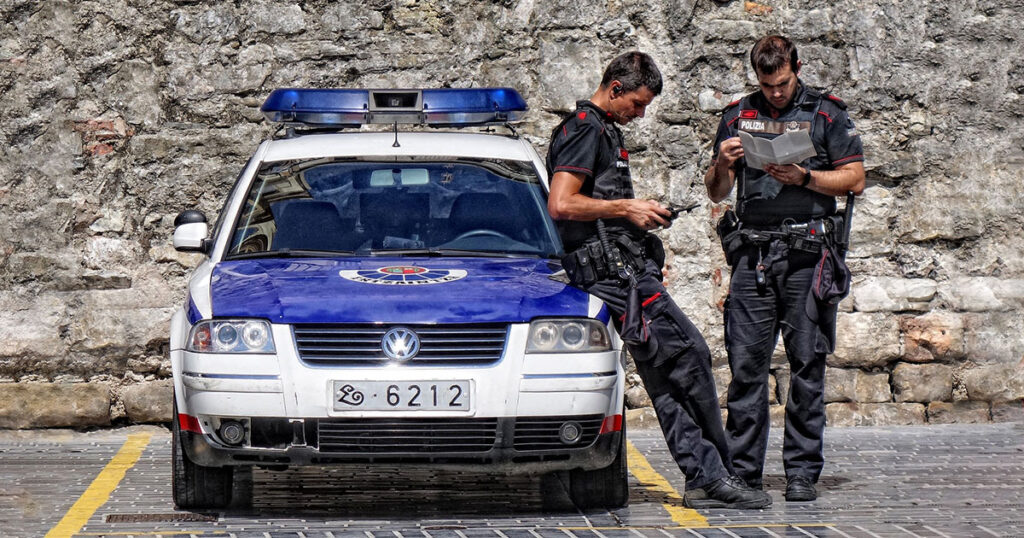
Suppose you need the police. In Spain, you can choose between the municipal police, also called the local police, the national police, and the civil guard. Each force has its special tasks and concerns, and although their duties sometimes overlap, something as pedestrian as a lost set of keys would be a matter for the local police. About a year ago, I dropped my house keys while out walking my dogs, so it was to the local police I went to ask if anyone had turned them in. “No,” said the man behind the desk. Then he checked in a box under the counter. “No, nothing here.”
If someone turned in a set of keys at the national police office across town, I asked, would the local police be notified? The officer told me that no central lost and found existed and that I would have to check with the national police directly. So I did. No luck. By the time I got home, I had found my keys—in an inside pocket. But for several days, I wondered why the two agencies couldn’t cooperate to ease a simple problem like recovering a lost object.
Recently, when my dogs, a black Lab and a German shepherd, escaped from their yard, I hurried straight to the local police to report them missing and to find out what else I should do. My dogs are not aggressive, but they are big. I didn’t think they’d pursue a runner or cyclist on the nearby river path, but if they saw a chicken wandering loose on a rural lane, they would give chase. Worse, if they spotted a lamb in a fenced field, they’d find a way in. Worst of all to contemplate would be a child in their path. My dogs would never attack a child, but isn’t that what so many dog owners say? “Not my dog,” they keep insisting, dumbfounded and horrified after a freak incident. A number of such stories had been circulating lately, and I wanted to get my dogs back quickly.
At the police station, I confirmed that the dogs were microchipped and had collars with tags. Nothing to do but wait, the police officer told me. He had my name and number and said he’d let me know if he got a call about any stray dogs. As I was leaving, he suggested I alert the civil guard, just in case, because it has jurisdiction over rural areas, where my dogs might be picked up. The civil guard has a station in La Pola, and there I hurried.
Before I was even done reciting my story, the officer helping me, a woman in her 30s, told me I should have gone to the local police.
“But I did,” I said, and explained.
The woman grumbled something and started away. Another officer in the same room asked what was up, and the woman angrily said it was the local police again and she was sick of it and was going to give them a piece of her mind. Shirking their duty, worming out of work! She snatched up a phone and called. “Wait,” I wanted to say, and explain that no one had passed the buck, no one was dodging their duties. But she seemed to have forgotten me. So I waited, and that was how I witnessed her half of the conversation, belligerent in tone and full of accusations. It went on for seven or eight minutes, and nothing was settled or solved in that time. After a while, the other two officers sitting at their computers began telling her to hang up on the guy. She did not want to. She angrily told the person on the other end that she was going to report him—to whom, I wondered—and asked for his identification number, which she repeated. Agent 37.
Hanging up, the woman complained some more to her fellow officers, who were vaguely sympathetic without being the least bit riled up. As for her, she gradually became calm. With no apology or explanation, she finished taking my personal information, still insisting that the problem of my missing dogs was for the local police, not for the civil guard. I was astonished at the bad relations between the civil guard and the local corps and sorry I’d ever said who’d sent me. Poor Agent 37.
I recovered my dogs that very afternoon. It was another 10 days before I could stop back at the local police station. The officer I’d spoken to wasn’t there. Had I to describe him, I’d have been at a loss, but I didn’t need to because I could identify him: Agent 37.
When I returned during Agent 37’s shift, I reminded him of the lost dogs, said I’d retrieved them, and thanked him for his help. He was as amiable as before. Then I said I had overheard the civil guard officer who called him that day, and I was very sorry for the tone she’d used. I had been astonished, I said. “Oh yes,” he answered, “I remember.”
On the one hand, I was offering sympathy, which he might appreciate. On the other hand, perhaps he blamed me, thinking something I had said set the other officer in motion. Plus, I was the outsider, the civilian, and maybe loyalty to the police, any police, would cause him to close ranks, as it were. Instead, he shook his head and smiled a trifle grimly. “Oh, don’t worry about that,” he said. “The argument is an old one.” He seemed neither worried nor much aggrieved by the tongue-lashing. A cool head. Local, I thought, is better.

